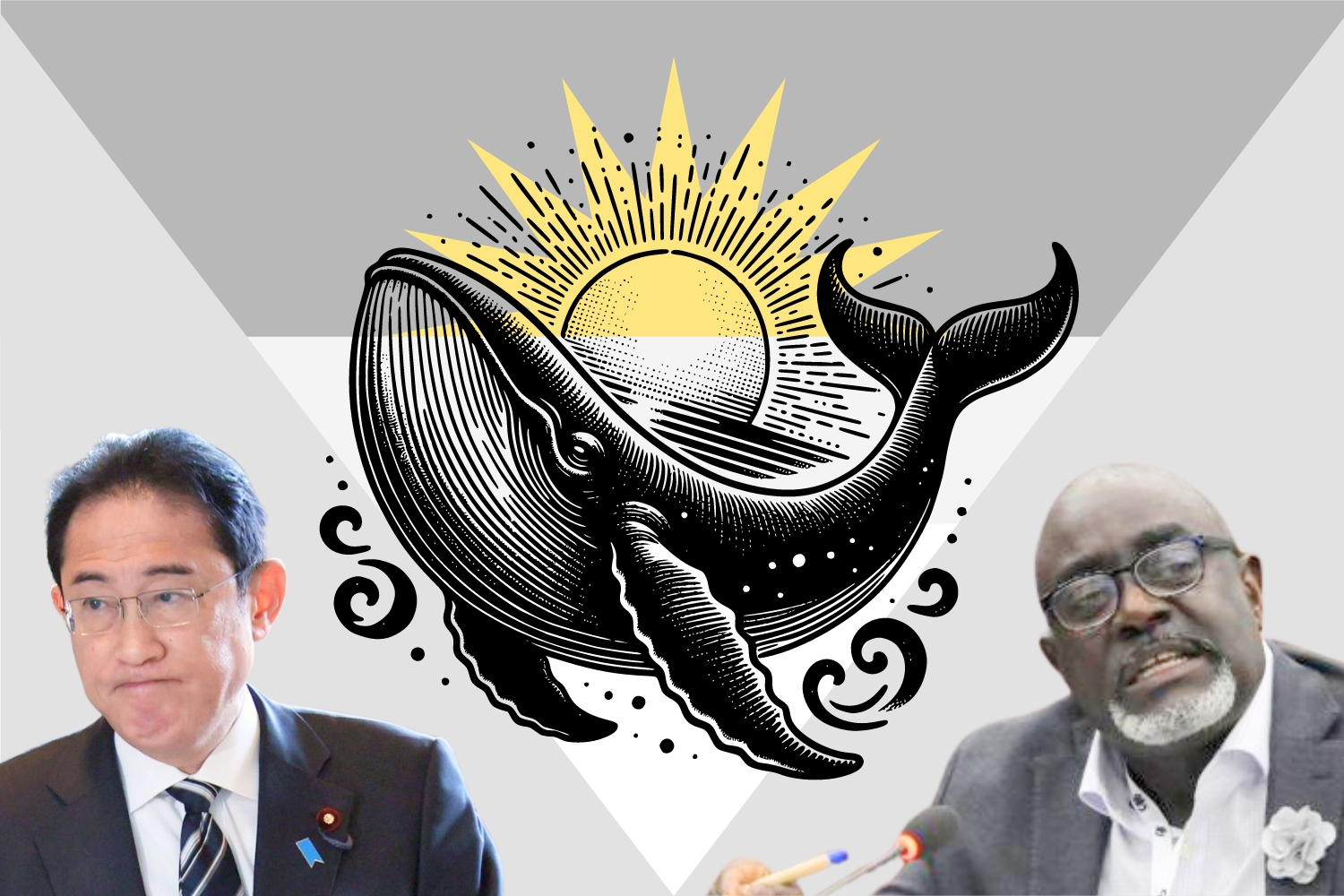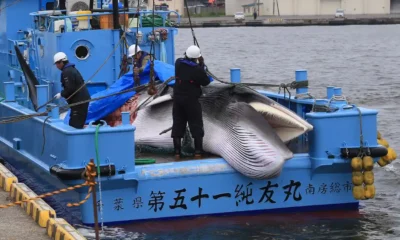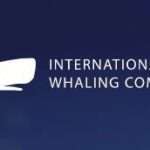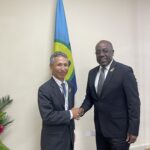
Whaling, Again?
By Kieron Murdoch | Opinion Contributor
Antigua and Barbuda is again in the media spotlight for calling for an end to the international moratorium on whaling ahead of a meeting of the International Whaling Commission (IWC) 69th Meeting in Peru.
This country has a long and illustrious history of promoting whaling this century, despite the fact that it does not have a whaling industry nor does it participate in or benefit from anyone else’s whaling industry, nor do its people buy, sell, or consume whale meat or by-products.
Antigua and Barbuda’s support for the practice has to do with its relationship with Japan – a longstanding relationship which has involved the flow of development aid from Japan to Antigua and Barbuda, and the flow of support for pro-whaling policy from this country to Japan. Let us not pretend for a moment that this is anything other than what it is.
It certainly doesn’t make us standout. Bilateral relations between the nations of the world are as often built on such beneficial exchanges as they are on moral positions. Some will always say that a developing country such as this one must do all it can to secure foreign aid. The real questions to be asked however, are: How long will this relationship go on? And has it not run its course?
As long as it has gone on, it has brought a negative spotlight to Antigua and Barbuda, painting us and the numerous other developing countries who have built such relationships as votes for hire.
Former Agriculture and Fisheries Minister, Joanne Massiah – who became the Spencer administration’s pro-whaling poster child – acknowledged as much in 2006 when she was quoted at the 58th IWC Meeting saying: “We are accused of selling our votes and prostituting our sovereignty. But as sovereign states we take great offence to this.”
But it is worth understanding how we got here. A 2019 BBC article on the subject of whaling quoted the IWC saying: “The IWC introduced a pause on all commercial whaling to give scientists time to gather information on populations and how many whales it would be safe to catch. This work was completed in 1994 and agreed by the IWC, but commercial whaling did not resume then.”
“Whilst some countries believe commercial whaling should be allowed and that there is scientific proof it does not [have to] damage overall whale populations, some other countries do not. Each [country] has its own culture, history and view on whaling, and it is not surprising that these can be very different, and it can be hard for everyone to agree.”
Japan spent years rallying support through aid diplomacy – as all great powers do – to overturn the IWC moratorium. Cumulatively, it has given hundreds of millions of US dollars in aid to countries such as Antigua and Barbuda, Dominica, Grenada, Guinea, Morocco, Panama, St. Lucia, Saint Vincent and the Grenadines, St Kitts and Nevis and the Solomon Islands. In turn, these countries consistently sided with Japan at the IWC while it was a member (it left in 2019).
The nature of these bilateral relationships was so transparent at times, that politicians and diplomats often didn’t bother to hide it. In 2001, then Prime Minister, Sir Lester Bird, was quoted by the Associated Press on the subject, openly stating: “So as long as the whales are not an endangered species, I don’t see any reason why if we are able to support the Japanese and the quid pro quo is that they will give us some assistance. I’m not going to be a hypocrite.”
Our support for Japan has been so consistent over the past two decades, that in 2019, Japan conferred Antiguan and Barbudan Ambassador, Daven Joseph – who, more than anyone else, has been carrying the pro-whaling standard on Antigua and Barbuda’s behalf over the last 20 years – with a Japanese national honour. At the Government House ceremony in January 2020 at which he accepted it, officials reported that Japan had by then invested US$108 million in fisheries infrastructure in Antigua and Barbuda.
It should be clear that Antigua and Barbuda’s stance on whaling has never been genuine. We don’t hunt whales. We have no whaling culture, tradition, history or interest, and we do not eat whale meat or use whale by-products. Our stance, like those of the other developing countries which have fallen in Japan’s camp, has been determined by Japan’s foreign aid budget. Today, Japan itself is no longer a member of the IWC.
In 2019, Japan finally withdrew from the organisation and resumed commercial whaling, no longer bound by the IWC rules. As a result, Japanese whaling must now only take place in Japan’s territorial waters and exclusive economic zones. Yet, Antigua and Barbuda, in 2022 and now again in 2024, is pursuing an end to the moratorium on whaling at the IWC (yet again). We come back to our original questions: How long will this relationship go on? And has it not run its course?
It is 2024. As the world’s multiple environmental crises deepen – global warming, climate change, ocean pollution, unlivable heat, habitat loss, coral reef destruction, biodiversity loss, species loss – why are we still committed to supporting Japanese whaling? Caribbean diplomats and politicians have spent the last two decades diminishing the value of terms like “sustainable use” and “food security”, by employing them in their pro-whaling rhetoric.
In more recent years, the government does not even appear to have a coherent whaling stance. In 2022, it suffered great embarrassment when the position of its IWC Commissioner did not appear to square up with that of government Ministers.
Ambassador Joseph submitted a resolution to reopen the formal debate on resuming commercial whaling, but the government issued a short statement in response to the subsequent bad press which read: “The Cabinet has not agreed to lift the ban on hunting of whales and is not aware of any statement which suggests otherwise.”
You will notice controversies like these every two years, and usually around this time. That is because the IWC, since 2012, has met every two years in even years in the months of September or October. True to form, ahead of this year’s meeting, Antigua and Barbuda recently made headlines again by submitting another resolution calling for an end to the moratorium on whaling observed by IWC member countries.
We come back to our questions: How long will this relationship go on? And has it not run its course? This country has been one of Japan’s mouthpieces for its fight against the global moratorium on whaling for over two decades. How much is enough? By now, we ought to have diplomats who speak Japanese fluently enough to be familiar with the Japanese word 売春婦 or “baishunfu”. It means prostitute.
About the writer:
Kieron Murdoch worked as a journalist and later as a radio presenter in Antigua and Barbuda for eight years, covering politics and governance especially. He is an opinion contributor at antigua.news. If you have an opinion on the issues raised in this editorial and you would like to submit a response by email to be considered for publication, please email [email protected]






Daven sounded like an old and well rehearsed Greta Thunberg. Smh. He making noise for whales like we does eat that shite. Lol How dare you defend something we didnt ask you to defend. Why dont you use that platform to speak against your prime minister actively underminiing the UPP. Talk bout that nuh!
Who is the author of this editorial? Has the pot stirer gone into hiding on this one? Even a Grade Six student could explain the concept of mutual economis support or alliances. To cheaper the argument by stating that since Antiguans and Barbudans do not consume whales we should not support any of our economic partners who do is nonsensical, especially when the country continues to derive enormous benefits from the Japanese, with respect to our fisheries which promote and protect the livelihood of especially our grassroot industries. KM and the swamp of yellow journalists can afford a daily diet of lobster shrimp, sushi and the like. Well, there are other persons who share our wide world who culturally harvest whales for dietary and other industrial purposes. Who gives us the right to select what can or cannot be harvested from our vast oceans? Stop insulting the intelligence of our people with copy-cat “the sky is falling” nonsense. No wonder their Party is over!
Dear Shameful., full of shame, so it’s the Hon. Prime Minister who is actively undermining the UPP! Come on, boy! Conduct a proper investigation, do some serious introspection and stop simplifying the real/many cause(s) of your party’s current demise! You blame everybody else and shamefully ignore the obvious. Lights out, music done, the dejay has left the building! Party Over!